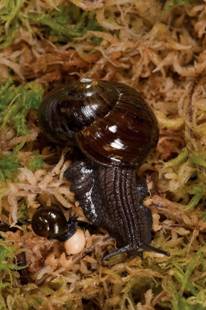Snail fridge deaths an avoidable tragedy

Powelliphanta augusta snails. Photo: Rod Morris
10 November 2011 –Wellington
Forest & Bird media release for immediate use
Snail fridge deaths an avoidable tragedy
Nature conservation organisation Forest & Bird is devastated that 800 native giant land snails from the West Coast have died in a Department of Conservation fridge.
“First, their natural home was destroyed for a coal mine on Stockton Plateau, and now they’ve died in captivity. This tragedy was entirely avoidable,” Forest & Bird Conservation Advocate Nicola Vallance said.
The Powelliphanta augusta giant land snails that died in the fridge were taken from the Stockton Plateau in 2006 to make way for Solid Energy’s open-cast coal mine. “All they lived on was 5 hectares on the top of Mt Augustus. We wanted that small corner left. Instead, Solid Energy mined the lot,” Nicola Vallance said.
“This is a sharp lesson that moving native animals from their natural habitat doesn’t work”
Some Powelliphanta augusta snails have been moved from the Department of Conservation fridges to the Denniston Plateau, which is right now threatened by another open-cast coal mine planned by Australian-owned Bathurst Resources. Forest & Bird is working to save these snails – and other wildlife including great spotted kiwi and West Coast green geckos – and would like to see a reserve created to protect the Denniston Plateau and its unique native plants and animals.
“Keeping our wildlife in fridges is obviously not how New Zealanders would like to care for native animals found nowhere else in the world. It’s a sad fact that this has been the best option for them because moving them back to the wild in other parts of the West Coast has not worked,” she said.
Landcare Research says the snails moved from the fridges to new sites last year are breeding too slowly for the populations to survive. New homes for the Powelliphanta augusta snails are limited because the snails can’t adapt to different habitats or because other snail species are already there.
“This has been an unfortunate experiment in keeping threatened native animals.”
ENDS


 Bill Bennett: Comcom warns 2degrees over satellite marketing
Bill Bennett: Comcom warns 2degrees over satellite marketing Transpower: Major Electricity Development For Western Bay Of Plenty A Step Closer
Transpower: Major Electricity Development For Western Bay Of Plenty A Step Closer Alcohol Beverages Council: Turning The Tide - New Zealanders Unite To Curb Harmful Drinking
Alcohol Beverages Council: Turning The Tide - New Zealanders Unite To Curb Harmful Drinking University of Auckland Business School: Economists Urge Action To Prevent ‘AI Poverty Traps’
University of Auckland Business School: Economists Urge Action To Prevent ‘AI Poverty Traps’ Bill Bennett: Australian warship takes rural fixed wireless broadband offline
Bill Bennett: Australian warship takes rural fixed wireless broadband offline NZ Telecommunications Forum - TCF: New Zealand Is Saying Goodbye To 3G: Are You Ready For The Change?
NZ Telecommunications Forum - TCF: New Zealand Is Saying Goodbye To 3G: Are You Ready For The Change?


